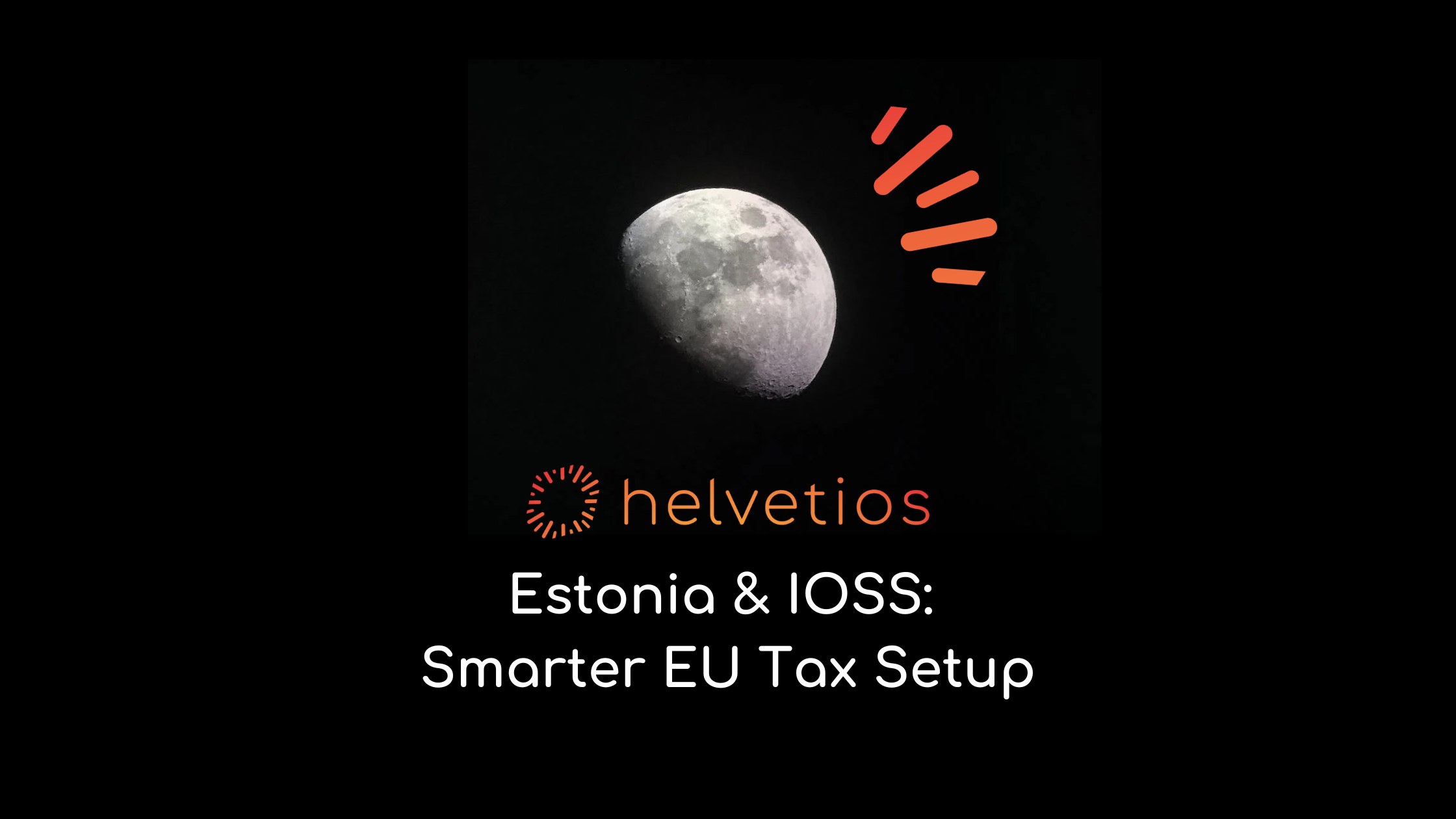Estonia’s business-friendly environment and innovative tax system make it an attractive jurisdiction for companies engaged in importing goods into the European Union (EU). This article explores how establishing an Estonian company can benefit businesses involved in EU imports, particularly through the Import One-Stop Shop (IOSS) scheme, and examines the tax implications for holding companies receiving dividends from subsidiaries.
Utilizing the Import One-Stop Shop (IOSS)
The IOSS is an EU-wide system designed to simplify VAT obligations for businesses importing goods valued at €150 or less. By registering for IOSS through an Estonian company, businesses can:
- Simplify VAT Collection: Charge and collect VAT at the point of sale, streamlining the process for both the seller and the buyer.
- Enhance Customer Experience: Avoid unexpected customs charges for customers, improving satisfaction and trust.
- Centralize Compliance: Manage VAT obligations across all EU member states through a single IOSS registration, reducing administrative burdens.
Estonia as a Gateway for EU Imports
Estonia’s digital-first approach and business-friendly policies make it an attractive base for companies looking to import goods into the EU. Estonian companies can register for IOSS either directly (if established in the EU) or via an intermediary if owned by non-EU residents. Key benefits include:
- EU Membership: As an EU member state, Estonia provides seamless access to the single market, eliminating customs duties and simplifying logistics for intra-EU trade.
- E-Residency Program: Estonia’s e-Residency allows non-residents to establish and manage EU-based companies remotely, facilitating international business operations.
- Efficient Tax System: Estonia’s corporate tax system is unique in that retained and reinvested profits are tax-exempt, with taxation occurring only upon profit distribution.
Taxation of Dividends in Estonian Holding Companies
Estonian holding companies benefit from a tax regime that avoids double taxation on dividends received from subsidiaries, provided certain conditions are met:
- Ownership Threshold: The Estonian company must hold at least 10% of the shares or votes in the subsidiary distributing the dividends.
- Taxation at Source: Dividends must have been subject to corporate income tax in the subsidiary’s country of residence.
- Non-Deductibility: The dividends should not have been deducted as expenses by the subsidiary.
When these conditions are satisfied, the dividends received by the Estonian holding company are exempt from further corporate income tax in Estonia. This mechanism effectively prevents the double taxation of the same income. This exemption applies when dividends have already been taxed at the subsidiary level, ensuring that Estonia does not impose additional corporate income tax on the same profit.
Recent Tax Changes in Estonia
As of January 1, 2025, Estonia has implemented changes to its corporate tax rates:
- Increased Corporate Tax Rate: The standard corporate income tax rate on distributed profits has increased from 20% to 22%.
- Unified Tax Rate on Dividends: The previously available reduced tax rate of 14% on regularly distributed dividends has been abolished. All dividends are now subject to the standard 22% rate.
These changes underscore the importance of strategic tax planning for businesses operating through Estonian entities.
Strategic Advantages for Import Businesses
By establishing an Estonian company, import businesses can:
- Optimize Tax Efficiency: Benefit from Estonia’s favorable tax regime, particularly the exemption on retained earnings and the avoidance of double taxation on qualifying dividends.
- Streamline VAT Compliance: Utilize the IOSS to manage VAT obligations across the EU efficiently.
- Leverage Digital Infrastructure: Take advantage of Estonia’s advanced digital services for company management, accounting, and tax reporting.
Conclusion
Estonia offers a compelling proposition for businesses engaged in importing goods into the EU. Its combination of EU membership, digital infrastructure, and a favorable tax environment—especially concerning dividend taxation and VAT compliance through IOSS—makes it an ideal jurisdiction for establishing a holding or operating company.
However, with ongoing tax reforms, strategic planning is more important than ever. Helvetios is here to help you navigate the complexities and build a structure that supports sustainable, international growth.
More information can be found on the official Government website of Estonia.
How Helvetios Can Help
At Helvetios, we specialize in guiding international entrepreneurs through the process of establishing and operating Estonian companies with a focus on import, e-commerce, and EU compliance.
We offer:
- Company Formation in Estonia with end-to-end support
- IOSS Registration & VAT Management tailored to your business model
- Ongoing Corporate Services including accounting, annual reporting, and tax filings
- Strategic Structuring for holding companies and cross-border dividend distribution
- Expert Advisory on optimizing tax exposure and complying with EU import regulations
Whether you are a startup entering the EU market or an established business looking to streamline your import operations, Helvetios ensures that your Estonian company is not only compliant but positioned for sustainable growth.
👉 Start your journey with us at helvetios.eu — your trusted partner in EU company formation and expansion.
Frequently Asked Questions: Estonian Companies for EU Imports
Why should I consider establishing an Estonian company for EU imports?
Estonia offers several key advantages: EU membership providing seamless single market access, a unique tax system where retained profits aren’t taxed, advanced digital infrastructure through the e-Residency program, and simplified VAT compliance through IOSS registration. This combination makes Estonia an ideal gateway for EU import operations.
Can non-EU residents establish Estonian companies?
Yes, through Estonia’s e-Residency program, non-residents can establish and manage EU-based companies remotely. This allows international entrepreneurs to access the EU market without physical presence in Estonia.
What types of businesses benefit most from Estonian incorporation for imports?
Businesses importing goods valued at €150 or less benefit significantly from IOSS registration. E-commerce companies, small-scale importers, and businesses seeking to streamline VAT compliance across multiple EU countries find Estonian incorporation particularly advantageous.
What is IOSS and how does it work?
IOSS (Import One-Stop Shop) is an EU-wide system that simplifies VAT obligations for imports of goods valued at €150 or less. It allows businesses to charge and collect VAT at the point of sale, manage compliance across all EU member states through a single registration, and avoid unexpected customs charges for customers.
Can my Estonian company register for IOSS directly?
If your Estonian company is owned by EU residents, it can register for IOSS directly. If owned by non-EU residents, registration must be done through an intermediary. Estonia’s business-friendly environment makes both options accessible.
What goods are covered under IOSS?
IOSS covers imported goods with a value of €150 or less. This threshold makes it particularly suitable for e-commerce businesses and small-scale import operations.
How does Estonia’s corporate tax system work?
Estonia has a unique corporate tax system where retained and reinvested profits are tax-exempt. Corporate income tax is only applied when profits are distributed as dividends. As of January 1, 2025, the tax rate on distributed profits is 22%.
What are the recent changes to Estonian tax rates?
Starting January 1, 2025, the corporate income tax rate on distributed profits increased from 20% to 22%. Additionally, the previously available reduced rate of 14% on regularly distributed dividends has been abolished—all dividends now face the standard 22% rate.
How are dividends from subsidiaries taxed in Estonian holding companies?
Dividends received by Estonian holding companies can be exempt from additional corporate income tax if three conditions are met: the Estonian company holds at least 10% of shares/votes in the subsidiary, the dividends were subject to corporate income tax in the subsidiary’s country, and the dividends weren’t deducted as expenses by the subsidiary.
Does this dividend exemption prevent double taxation?
Yes, when the conditions are met, this exemption mechanism effectively prevents double taxation of the same income, as dividends already taxed at the subsidiary level won’t face additional corporate income tax in Estonia.
What digital services does Estonia offer for company management?
Estonia provides advanced digital infrastructure for company management, including online accounting systems, digital tax reporting, and comprehensive e-governance services. This digital-first approach significantly reduces administrative burdens.
How does EU membership benefit Estonian companies in import operations?
EU membership eliminates customs duties for intra-EU trade, simplifies logistics, provides access to the single market of 450+ million consumers, and enables seamless movement of goods across member states.
Can Estonian companies help streamline compliance across multiple EU countries?
Yes, through IOSS registration, Estonian companies can manage VAT obligations across all EU member states through a single registration, significantly reducing administrative complexity and costs.
How do recent tax changes affect strategic planning?
With the increase in corporate tax rates and elimination of reduced dividend rates, strategic tax planning becomes more critical. Companies should consider timing of profit distributions, holding company structures, and reinvestment strategies to optimize tax efficiency.
What should businesses consider when structuring Estonian holding companies?
Key considerations include the ownership threshold for dividend exemptions (minimum 10%), ensuring subsidiaries’ dividends have been properly taxed at source, planning distribution timing to optimize tax exposure, and maintaining compliance with both Estonian and EU regulations.
Is professional assistance recommended for Estonian company formation?
Given the complexity of EU import regulations, tax implications, and ongoing compliance requirements, professional assistance is highly recommended to ensure proper structuring, compliance, and optimization of tax benefits.
What ongoing compliance requirements should I expect?
Estonian companies must maintain proper accounting records, file annual reports, manage VAT obligations (including IOSS reporting if applicable), comply with EU import regulations, and handle corporate tax filings for any distributed profits.
How often must IOSS returns be filed?
IOSS returns must typically be filed monthly, reporting VAT collected on imports across all EU member states where goods were delivered.
What documentation is required for dividend tax exemptions?
Documentation should prove the ownership percentage (minimum 10%), evidence that dividends were subject to corporate income tax in the subsidiary’s jurisdiction, and confirmation that dividends were not deducted as expenses by the paying subsidiary.









